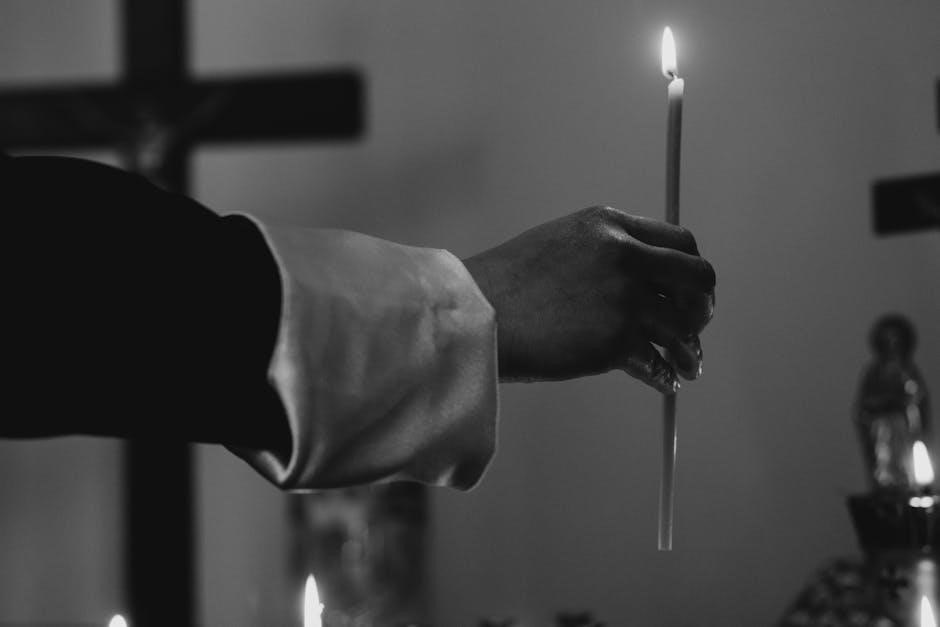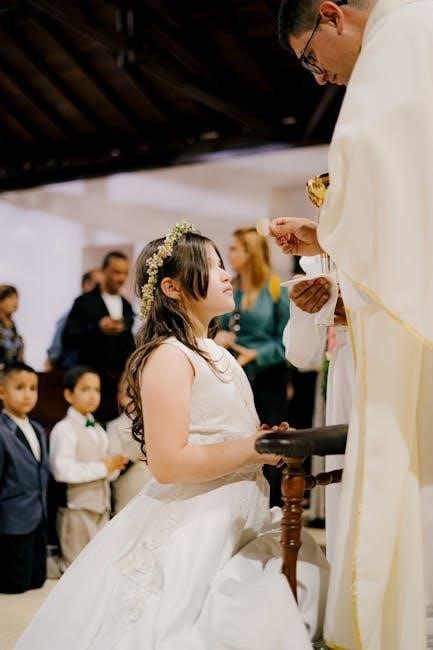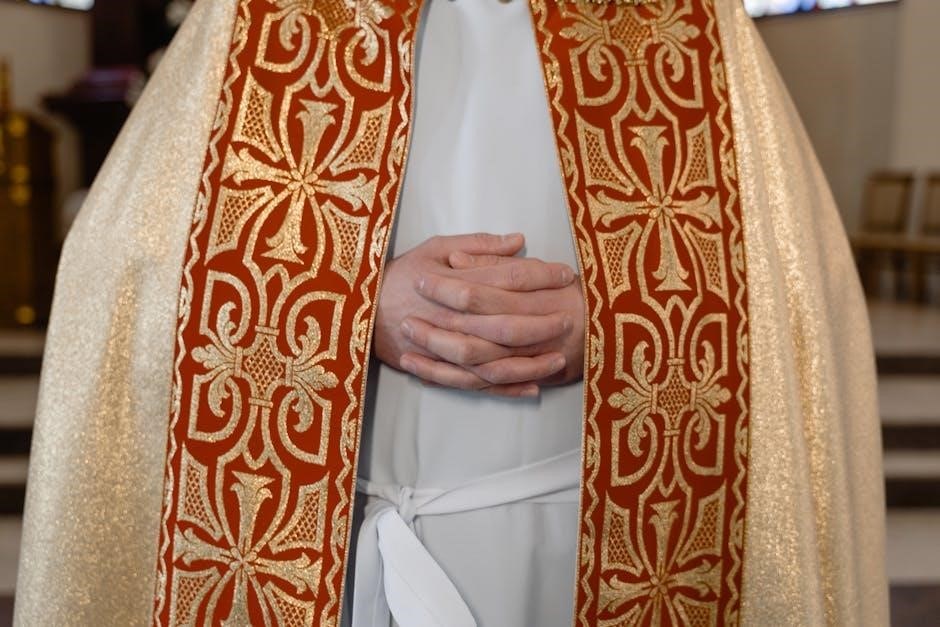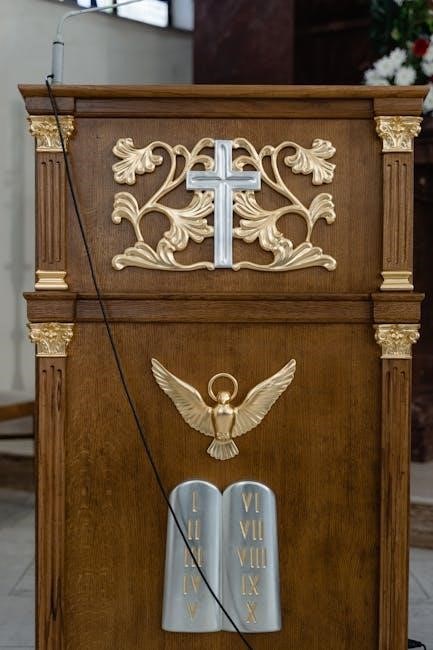Prayer after Holy Communion is a sacred moment to deepen spiritual connection with Christ, expressing gratitude, seeking forgiveness, and growing in holiness through heartfelt devotion and reflection.
1.1 The Significance of Prayer After Receiving the Eucharist
Prayer after receiving the Eucharist holds profound significance as a moment to express gratitude, seek forgiveness, and deepen unity with Christ. It is an act of faith, acknowledging His real presence, and a time to reflect on the transformative power of the Sacrament. This prayerful dialogue strengthens spiritual connection, fostering a heart of thanksgiving and a desire for holiness. It is a sacred opportunity to surrender to God’s love and grace.
1.2 The Purpose of Post-Communion Prayer
The purpose of post-Communion prayer is to express heartfelt gratitude for the Eucharist, seek forgiveness, and deepen intimacy with Christ. It serves as a moment to reflect on the gifts received and to ask for the grace to live according to His will. This prayerful dialogue with God strengthens faith, fosters spiritual growth, and helps integrate the transformative power of the Sacrament into daily life, inviting Christ to remain in the soul.

Theological Foundation of Prayer After Holy Communion
The theological foundation of post-Communion prayer lies in biblical teachings and the Holy Spirit’s role in deepening communion. It emphasizes the Eucharist as a sacrifice and gift, fostering union with Christ and transforming believers through grace and devotion, rooted in scripture and Church tradition.
2.1 Biblical Roots of Post-Communion Prayer
The biblical roots of post-Communion prayer are found in scripture, particularly in the Gospels and epistles. Jesus’ prayer of thanksgiving during the Last Supper (Luke 22:19-20) and Paul’s exhortation to pray continually (1 Thessalonians 5:17) establish prayer as a vital response to the Eucharist. These teachings emphasize gratitude, intercession, and spiritual renewal, forming the cornerstone of post-Communion devotion and fostering a deeper relationship with Christ.
2.2 The Role of the Holy Spirit in Deepening Communion
The Holy Spirit transforms prayer after Holy Communion, deepening intimacy with Christ. Through the Spirit, believers experience spiritual renewal and intercession, aligning their hearts with God’s will. The Spirit’s presence fosters gratitude, penitence, and devotion, enabling a profound connection with the Eucharist. This divine assistance strengthens faith, illuminates scripture, and guides believers in living a holy life, enriching their prayer life and relationship with Christ.

Types of Prayers After Holy Communion
Prayers after Holy Communion include thanksgiving, intercession, and penitence, each serving unique purposes in deepening devotion, seeking forgiveness, and petitioning for spiritual and temporal needs.
3.1 Prayers of Thanksgiving
Prayers of thanksgiving after Holy Communion express profound gratitude for the sacred gift of the Eucharist, honoring Christ’s sacrifice and presence. These prayers acknowledge the divine encounter, seeking to deepen our relationship with God and foster spiritual growth. They are a heartfelt response to the grace received, emphasizing awe, love, and commitment to living a life transformed by Christ’s love.
3.2 Prayers of Intercession
Prayers of intercession after Holy Communion involve praying for others, including the Church, family, and those in need. These prayers reflect a selfless expression of faith and love, inspired by the Holy Spirit. They often seek blessings, healing, and guidance for others, fostering a sense of community and unity. Intercessory prayers deepen one’s compassion and commitment to serving others, aligning with Christ’s mission of love and redemption.
3.3 Prayers of Penitence and Forgiveness
Prayers of penitence and forgiveness after Holy Communion express sorrow for sins and seek divine mercy. These prayers acknowledge human frailty, imploring Christ’s pardon and healing. They emphasize spiritual renewal, inviting the Holy Spirit to cleanse the heart and strengthen virtue. By seeking forgiveness, believers deepen their humility and commitment to a life of holiness, aligning with the Eucharist’s grace to transform and sanctify.

Classic Examples of Post-Communion Prayers
Timeless prayers by saints like Thomas Aquinas, Padre Pio, and Basil the Great offer profound expressions of gratitude, penitence, and devotion, guiding believers in deepening their communion with Christ.
4.1 The Prayer of St. Thomas Aquinas After Communion
St. Thomas Aquinas’s prayer after Communion is a masterpiece of devotion, expressing profound gratitude for the Eucharist. He implores God to grant perseverance in faith, humility, and love. The prayer emphasizes the transformative power of the sacrament, seeking divine assistance to avoid sin and remain steadfast in holiness. Its rich theological depth and heartfelt surrender make it a timeless model for post-Communion reflection and worship.
4.2 The Prayer of St. Padre Pio After Holy Communion
St. Padre Pio’s post-Communion prayer reflects his deep love for the Eucharist, imploring Jesus to remain close and guide his life. He seeks healing, strength, and the grace to avoid sin, emphasizing adoration, thanksgiving, and supplication. The prayer captures his mystical union with Christ, embodying his devotion to the sacredness of Holy Communion and its transformative power in the soul.
4.3 The Prayer of St; Basil the Great After Communion
St. Basil the Great’s prayer after Communion reflects his profound Eucharistic devotion, blending adoration, thanksgiving, and supplication. He implores Christ for healing, strength, and the grace to avoid sin, while expressing deep gratitude for the sacrament. The prayer, rooted in his liturgical legacy, embodies his mystical union with Christ and underscores the transformative power of Holy Communion in the life of the faithful.

Modern Reflections and Devotions
Modern reflections emphasize personal prayer, Scriptural meditation, and communal worship after Communion, fostering intimacy with Christ and spiritual renewal through heartfelt devotion and contemporary practices.
5.1 Personal Reflections After Receiving the Eucharist
Personal reflections after receiving the Eucharist involve a heartfelt dialogue with Christ, expressing gratitude, and seeking healing. This intimate moment allows individuals to connect deeply with God, fostering spiritual growth and renewal. Many use silence or spoken prayer to surrender their lives to Christ, asking for pardon and strength. Reflections often emphasize the transformative power of Communion, inspiring believers to live virtuously and serve others with love.
5.2 Using Scripture in Post-Communion Prayer
Scripture enriches post-Communion prayer, offering a meaningful way to express gratitude and seek divine guidance. Many use biblical passages, such as the Lord’s Prayer or Psalms, to structure their devotion. Reflecting onScripture helps deepen the Eucharistic experience, fostering a closer relationship with Christ and aligning personal prayers with God’s Word, while also finding comfort and inspiration in sacred texts.
5.3 Incorporating Hymns and Songs into Prayer
Hymns and songs add a beautiful dimension to post-Communion prayer, expressing joy and gratitude through music. Singing sacred melodies fosters a spirit of worship and reflection, deepening the Eucharistic experience. Many hymns are rooted in Scripture, making them a powerful way to connect with God’s Word and celebrate the gift of Communion, while also uniting believers in shared devotion and praise.

The Role of Mary and the Saints in Post-Communion Prayer
The Role of Mary and the Saints in Post-Communion Prayer involves seeking their intercession and guidance to deepen one’s spiritual connection with Christ and live virtuously.
6.1 Invoking the Intercession of the Blessed Virgin Mary
Mary, as the Mother of God, is often invoked in post-Communion prayers for her intercession and maternal guidance. Her role as a spiritual mother deepens the believer’s connection to Christ, fostering humility, love, and devotion. Prayers such as “Mary, my Mother, pray to Jesus for me” reflect the Catholic tradition of seeking her assistance to live virtuously and remain faithful to God’s will, strengthened by the Eucharist.
6.2 Seeking the Guidance of the Saints in Prayer
The saints, as models of faith and holiness, offer guidance and inspiration in post-Communion prayer. Their intercession is sought to deepen devotion and imitate their virtues. Prayers like those of St. Thomas Aquinas and St. Padre Pio reflect a reliance on their spiritual wisdom, fostering a communal bond with the Church Triumphant. This practice enriches the prayer life, encouraging believers to emulate their love for Christ and fidelity to His will.

Practical Tips for Deepening Your Prayer Life After Communion
Prayer after Communion can be enriched by setting aside dedicated time, using prayer books, and reflecting on Scripture to foster intimacy with Christ and transform the experience.
7.1 Creating a Prayerful Atmosphere
Creating a prayerful atmosphere after Holy Communion involves finding a quiet, reflective space to deepen your connection with Christ. Use prayer books or sacred texts to guide your devotion, and consider setting aside time for silent reflection or journaling. Reflecting on the Eucharist’s meaning and seeking forgiveness can also enhance your prayer experience, fostering a deeper spiritual encounter and intimacy with God.
7.2 Overcoming Dryness in Prayer
Experiencing dryness in prayer after Holy Communion is common. To overcome it, set specific times for prayer, use reminders, and remember that prayer is real communication with God. Persisting through these moments strengthens your relationship with Christ, even when feelings of connection are absent. Embrace the journey, trusting that your efforts deepen your spiritual life and draw you closer to God.
7.3 The Importance of Consistency in Prayer
Consistency in prayer after Holy Communion is vital for nurturing a deep, lasting relationship with Christ. Regular devotion helps maintain spiritual strength and growth, even when emotions fluctuate. Commitment, rather than feelings, sustains this practice, ensuring ongoing communication and connection with God. Over time, consistent prayer enriches faith, deepens intimacy, and fosters a lifelong journey of spiritual renewal and closeness to Christ.

The Liturgical Context of Post-Communion Prayer
Post-Communion prayer is deeply rooted in liturgical tradition, emphasizing the Collect, Prayer over the Offerings, and Preface. These elements guide believers in expressing gratitude and deepening their connection with Christ.
8.1 The Dismissal Prayer in the Liturgy
The dismissal prayer serves as the final blessing after Holy Communion, concluding the Eucharistic rite. It emphasizes gratitude and sends the faithful forth to live Christ’s teachings. Rooted in liturgical tradition, this prayer strengthens the bond between believers and Christ, while also fostering unity within the community. Its purpose is to inspire believers to carry the grace of Communion into their daily lives.
8.2 The Collect, Prayer Over the Offerings, and Preface
The Collect, Prayer Over the Offerings, and Preface are integral to the liturgical structure, preparing the faithful for Holy Communion. The Collect gathers the community’s intentions, while the Prayer Over the Offerings consecrates the gifts. The Preface, a solemn dialogue, expresses gratitude and leads into the Eucharistic Prayer, fostering a spirit of worship and unity. These prayers deepen devotion and readiness to receive Christ in the sacrament.

The Spiritual Benefits of Prayer After Holy Communion
Prayer after Holy Communion offers profound spiritual benefits, including healing, forgiveness, and a deeper relationship with Christ. It fosters holiness, virtue, and a heart filled with grace and peace.
9.1 Strengthening Your Relationship with Christ
Prayer after Holy Communion deepens our relationship with Christ, allowing us to thank Him for the Eucharist and seek forgiveness. It helps us express love and remain in His presence, fostering an intimate connection. Through this prayer, we invite the Holy Spirit to transform us, leading to a life of virtue and devotion. Regular post-Communion prayer nurtures a stronger bond with Christ, enriching our spiritual journey.
9.2 Seeking Healing and Forgiveness
Prayer after Holy Communion offers a profound opportunity to seek healing and forgiveness. By humbly asking for pardon, believers can experience spiritual renewal and grace. The Eucharist, as a sacrifice of reconciliation, provides strength to overcome sin and grow in holiness. Through prayer, we invite Christ’s healing touch, restoring our souls and deepening our commitment to a life of faith and devotion.
9.3 Growing in Holiness and Virtue
Prayer after Holy Communion nurtures spiritual growth, fostering holiness and virtue. By uniting with Christ, believers are transformed, receiving grace to embrace His teachings and live a life of love and service. This sacred moment strengthens the soul, enabling us to imitate Christ’s virtues, such as humility, compassion, and patience, and to strive for sanctity in daily life.
May prayer after Holy Communion deepen your union with Christ, seeking forgiveness and healing. Go forth in grace, nurturing a life of virtue and devotion to God.
10.1 Summarizing the Importance of Post-Communion Prayer
Post-Communion prayer is vital for deepening your spiritual connection with Christ, fostering gratitude, and seeking forgiveness. It strengthens your relationship with God, nurtures holiness, and invites divine grace to transform your life. This sacred practice helps you reflect on the Eucharist’s gifts, grow in virtue, and live as a child of God, embodying love and devotion in daily life.
10.2 Encouragement to Persist in Prayer
Persevere in prayer, for it strengthens your faith and deepens your union with Christ. Even in moments of dryness, prayer is a powerful act of love and commitment. Embrace it as a daily rhythm, trusting that God hears and transforms your life. Persisting in prayer fosters a deeper relationship with Him, bringing comfort, guidance, and grace. Make it a lifelong journey of devotion and growth.
